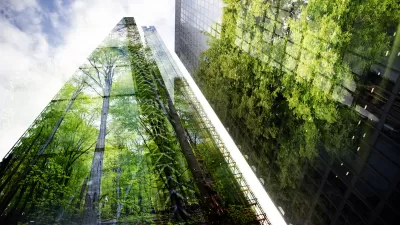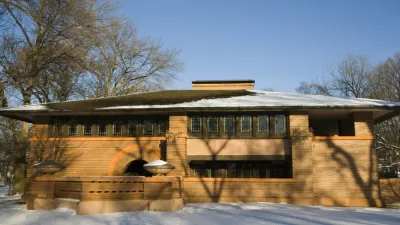Buildings are designed to ensure fully mechanized comfort. Architect Terri Meyer Boake argues that designers need to think in terms of a spectrum of comfort in designing the reduced-impact buildings of the future.
"Terri Meyer Boake teaches sustainable design at the University of Waterloo, and is teaching architects how to prepare for the 2030 challenge, where architects are working toward making buildings zero carbon. This will involve a lot more natural lighting, ventilation and passive solar. But one problem is our expectations."
"Terri...notes that today's architects and mechanical engineers don't work within [a] zone, but to a 'finite point of expected comfort for 100% mechanical heating and cooling.'"
"Meyer Boake also notes that you must design differently for different climate regions, something that one would think would be pretty obvious, yet condos and houses look pretty much the same in California or North Dakota. But if you need heat for much of the year you are going to deal with the sun differently than if you need cooling"
Thanks to Franny Ritchie
FULL STORY: The Comfort Zone vs Comfort Point

Maui's Vacation Rental Debate Turns Ugly
Verbal attacks, misinformation campaigns and fistfights plague a high-stakes debate to convert thousands of vacation rentals into long-term housing.

Planetizen Federal Action Tracker
A weekly monitor of how Trump’s orders and actions are impacting planners and planning in America.

San Francisco Suspends Traffic Calming Amidst Record Deaths
Citing “a challenging fiscal landscape,” the city will cease the program on the heels of 42 traffic deaths, including 24 pedestrians.

Defunct Pittsburgh Power Plant to Become Residential Tower
A decommissioned steam heat plant will be redeveloped into almost 100 affordable housing units.

Trump Prompts Restructuring of Transportation Research Board in “Unprecedented Overreach”
The TRB has eliminated more than half of its committees including those focused on climate, equity, and cities.

Amtrak Rolls Out New Orleans to Alabama “Mardi Gras” Train
The new service will operate morning and evening departures between Mobile and New Orleans.
Urban Design for Planners 1: Software Tools
This six-course series explores essential urban design concepts using open source software and equips planners with the tools they need to participate fully in the urban design process.
Planning for Universal Design
Learn the tools for implementing Universal Design in planning regulations.
Heyer Gruel & Associates PA
JM Goldson LLC
Custer County Colorado
City of Camden Redevelopment Agency
City of Astoria
Transportation Research & Education Center (TREC) at Portland State University
Jefferson Parish Government
Camden Redevelopment Agency
City of Claremont




























